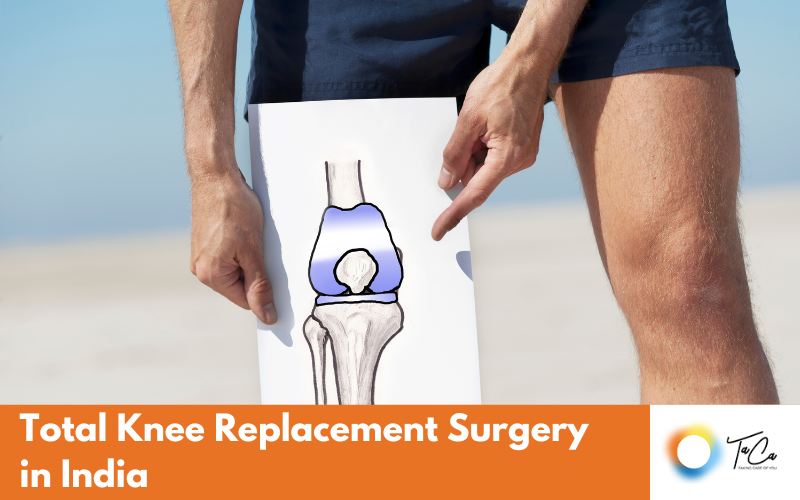Total Knee replacement surgery involves the replacement of components of damaged or worn-out knee joints. The operation can help relieve discomfort and improve knee function. Your age, weight, activity level, knee size and form, and overall health all influence the best artificial joints and surgical approaches for you.
During the procedure, impaired cartilage and bone are substituted with metal and plastic components. A surgeon examines your knee’s mobility, stability, and strength to determine whether a knee replacement surgery is the best option for you. X-rays assist in determining the amount of damage.
Total knee replacement surgery Procedure
The damaged surfaces of the knee joint will be removed, and the knee joint will be resurfaced with the prosthesis. Metal and plastic are used to make the knee prosthetic. A cemented prosthesis is the most frequent form of artificial knee prosthesis. Uncemented prostheses are no longer often used.
Surgical cement is used to glue a cemented prosthesis to the bone. An uncemented prosthesis has a porous surface on which the bone develops to stick to the prosthetic. A mixture of the two kinds is sometimes utilized to replace a knee. The prosthesis typically is made up of three parts: the tibial component (which resurfaces the top of the tibia, or shin bone); the femoral (thigh bone) component (which resurfaces the end of the thighbone); and the patellar component (which resurfaces the bottom of the kneecap that brushes against the thighbone).
A hospital stay is required for knee replacement. Procedures may differ based on your health and the practices of your doctor. Knee replacement surgery is often conducted while you are unconscious under general anesthesia. Your anesthesiologist will go through this with you ahead of time.
Recovery after Knee replacement surgery in India
Knee surgery, like other major surgical operations, requires a period of healing once the treatment is completed. Although the healing time cannot be totally taken away, you can take efforts to reduce its duration. If you’re scheduled to have knee surgery soon, use these five practices to help pace up your recovery process.
- Comply with all medical guidance.
Always follow all of your surgeon’s instructions and advise. Your surgeon is a medical specialist who understands what recovery entails. If they prescribe medication, urge rest, or give you additional advice, follow them strictly.
- Take frequent walks Once You’ve Been Permitted
Go for a walk many times a day after you’ve been cleared to put weight on your leg and walk. Walking improves circulation, which reduces swelling and ensures that the tissue in the knee receives sufficient nutrients and oxygen.
- Opt for Healthier Diet
While eating healthy meals is always a good notion, fruits, vegetables, and other nutritional foods are especially crucial after surgery.
- Get Enough Sleep
Sleep is beneficial to your health in a variety of ways. It is discovered that a lot of healing and strengthening occurs during sleep and that it aids in physical recovery.
- Participate in Physical and Occupational Therapy Exercises
Following tkr surgery, your body will have to retrain and strengthen the joint. This is accomplished through physical and occupational therapy. The former concentrates on the range of motion, strength, fitness, and other components of rehabilitation, while the latter looks at how to overcome real-world challenges
What is the Approx Recovery Time you need post knee surgery?
The usual healing period after knee replacement surgery is six months, but it may require up to a year to properly resume physically demanding activities. Though recovering might be long, there are things you can do to ensure a speedy recovery.
After knee replacement Risks
Knee replacement surgery, like any other procedure, has potential risks. They are as follows:
- Clots form in the blood. To avoid this danger, surgeons often prescribe blood-thinning medications. The leg is the most prevalent site for blood clots. They can, however, reach the lungs and be lethal.
- Damage to the nerves. Nerves in the vicinity of the implant might be damaged. Numbness, weakness, and discomfort can result from a nerve injury.
- Infection: Infection can arise at the incision site or in deeper tissue layers. In some cases, surgery is required for the treatment of an infection.
- Knee replacement implants are persistent, however, they might become loose or worn over time. A further operation to replace the loose or worn pieces may be required if this occurs.
Final thoughts
Total Knee replacement surgery is a very common and effective operation. Over 90% of persons who have knee replacement surgery report considerable improvement in pain and functionality. For the majority of patients, knee replacement improves their quality of life by restoring independence and allowing them to participate in activities they previously enjoyed. Contact us now to learn more about Total Knee replacement surgery in India and to schedule a consultation with one of our top doctors. TaCa experts would be pleased to clear up any confusion and assist you in making a sensible choice.






